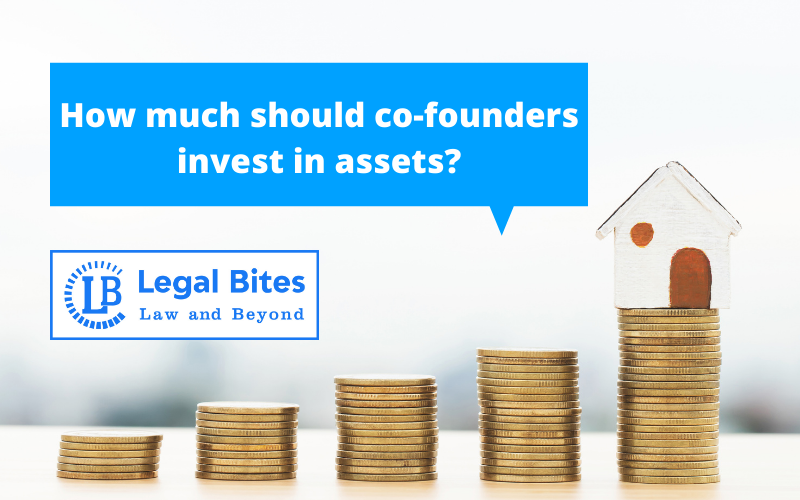How much should co-founders invest in assets?
This article titled ‘How much should co-founders invest in assets?’ is written by Mayank Shekhar and deals with the question of how much co-founders should invest into assets in two parts. Firstly, it deals with the question of if co-founders need to invest at all, and if they do decide to do so, what is the amount that… Read More »
;
This article titled ‘How much should co-founders invest in assets?’ is written by Mayank Shekhar and deals with the question of how much co-founders should invest into assets in two parts.
Firstly, it deals with the question of if co-founders need to invest at all, and if they do decide to do so, what is the amount that they should invest. Secondly, it deals with how much they should invest in assets, not strictly in the monetary sense but what part of an investment amount should be put into assets.
How much should co-founders invest in assets?
While starting a new business investment becomes a vital part of crossing the point from an idea to a business. Every business needs some assets before it can become functional. Investing in these assets can be tricky. While starting a new business a certain amount of assets is required to kick it off, what assets need to be invested in and how much, completely depends on the needs of the company.
For example, in the case of a company by Elon Musk where the goal is to send a spaceship to Mars the investment that would be required would be extremely high. In a situation where funding is not found from outside sources at the very beginning or it’s a small business co-founder may decide to pitch in the amount required for the assets in the beginning.
I. Should co-founders invest in assets, and what is the amount they should invest?
There is no specific requirement for co-founders to invest in their business, hence there is no specific amount that co-founders must invest in assets.
Firstly, dealing with the question of ‘co-founders investing’, in most cases it is actually beneficial for co-founders to not invest in a business and instead get venture capitalists or go through crowdfunding, or any other method to gain the required investment.
This is due to the fact that it is highly possible that there might be a falling out between co-founders as its company is just starting out. In that case, it would lead to an extremely complicated situation.
That being said it’s been noticed that in the case of many companies that have now made their mark in the world, that in the beginning getting outside investors can be quite difficult and the co-founders may have to pitch in. The amount that is commonly seen to have been invested by co-founders is around 10000 to 15000 dollars.
For example, in the case of vice media two of the co-founders put in 10000 dollars and one of the co-founders brought in in computers worth 5000 dollars. Even Google started with an investment of 15000 dollars by two of its co-founders.
That seems to be the amount needed for most companies to be able to set up minimal working conditions for the company, post that the companies can pitch their idea to venture capitalists and other possible investors and raise institutional investment.
This initial investment amount can also come through a Kickstarter as it did in the case of a very popular game that we now know as cards against humanity.
Hence while it is suggested to first try and get investment from outside, in a situation where a company is having a hard time sparking interest amongst investors, the magic range of 10000-15000 dollars might be the perfect amount for the co-founders to invest to get the company at least up and running to a point where one can then try for institutional investment.
II. How much investment should go into assets?
Secondly, dealing with exactly how much should be invested in assets, while we have already discussed the fact that there is no specific number and that it depends on the company and the kind of assets required, the amount that should be invested by the co-founders should be enough to get the business running but not so much that if it does not take off quickly and the business is in a loss, that there will be a huge amount of money lost.
Investing in any new business carries a huge risk, and that risk should be kept in mind while using sweat equity for assets. Co-founders should properly assess the assets that are most necessary to keep the business going for at least three years before the business starts reaping huge profits and investing in those specific assets.
This is because most businesses take a few losses in the beginning before they take off, Amazon, a current business giant, was a loss-making company for several years, before it became the force that we know it as today, hence this is something to keep in mind while co-founders invest their own money in assets.
A good strategy is always to ensure that you invest a little in several different required assets instead of investing a lot in one asset. It’s also important to consider which assets can be re-sold in the future, that is the future use and profitability of an asset if the business doesn’t work out.
It’s true that one does not like to consider the possibility of their business failing while investing in it, but when co-founders are investing in asserts themselves, it’s extremely pertinent to consider all these factors.
References
1. Dave Schools, Founders Who Are Serious About Their Startup Invest This Much Money at the Beginning, VICE, Google, Reddit, and others started with the same amount of cash — often the founders’ own money, Available Here.
2. Carolyn Deng, CFA, Startup Financing for Founders: Your Companion Checklist, Available Here.

